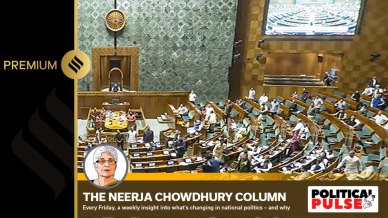A tale of two Parliament attacks — and shifting sands of politics, from rivalry to bad blood
2023 has seen disquieting suspension from Parliament of 14 MPs for flagging its security breach; Oppn would not be worth its salt if it doesn't hold govt to account on such a grave issue

On December 13, 2001, India’s then Vice-President and Rajya Sabha Chairman, Krishan Kant, was heading to the exit gate of Parliament meant for the “V-P”; the convoy of cars parked outside the gate was ready to take him to his residence. The back door of his car had already been opened for him.
Kant had almost reached the exit gate, when someone came running after him. A group of MPs had come to his chamber to see him urgently. The V-P turned around and went back to his chamber.
While Kant was talking to the MPs in his office, there were sound of firing from outside. A car (with terrorists) came towards his vehicle and scraped it and firing ensued; a security guard from his team was killed. The massive Parliament gates were hastily closed.
The terrorists had mounted an attack on the Parliament of India, opening fire through its complex. The idea seemed to be to hold India’s top leaders inside the Parliament House “hostage”. But thanks to prompt retaliation by the security staff, they were not able to enter into the building. Eight security personnel lost their lives that day.
The then Home Minister L K Advani rushed into Kant’s chamber to enquire about his safety. Prime Minister Atal Behari Vajpayee called him up, the President spoke to him. MPs from all parties filled his chamber to congratulate him for his lucky escape.
Only minutes earlier, a concerned Sonia Gandhi, the then Congress president, had called up PM Vajpayee. She wanted to make sure he was “safe”. A scribe later remarked, “It was a reassuring sign that day that India’s democracy was safe.” For it showed that political opponents need not be enemies.
Parliament was attacked again this year. The date was the same — 13 December. But there was a gap of 22 years in between. In 2001, the terror attack was well-planned, using firearms – but the terrorists did not manage to storm the building. This time, two men managed to come in, getting past three security checkpoints to enter into the Lok Sabha. They set off yellow gas canisters which they had managed to smuggle in. They did not use firearms — and no one was hurt, nor was the Parliament building damaged.
The intruders said they were unemployed and wanted to protest—unlike in 2001, they seemed amateurs but their claims will have to be investigated further. “Protest” or otherwise, they managed to show how easy it was to breach the security of Parliament—and the supposedly foolproof new Parliament building at that.
Watching them on TV, it seemed bizarre that the intruders had managed to do so in the country’s supposedly most protected building, jumping from the visitors’ gallery into the Lok Sabha chamber, hopping from one table to the next in the House until they were overpowered by the MPs and security staff. That it should be happening in the world’s most populous democracy— one that prides itself as the world’s fifth largest economy and as a nation moving away from its old image of being a “soft” State—it has filled many with disquiet.
After the 2001 attack, old timers recall that a committee was set up to beef up security—with steps like the use of the CCTV cameras, the RFIDs on bonafide parliament cars, issuing photo ID cards to visitors, measures to deflate tyres if needed, barricades on approach roads, the closing of two main Parliament gates.
And now also, security can be expected to be tightened, which would also result in further constricting the access of media persons and visitors to Parliament.
In 2001, the Opposition took the government to task for its “laxity” on the floor of the House. But the two sides also moved in step to ensure that correctives were put in place. 2023 has seen the disquieting phenomenon of the suspension from Parliament of 14 MPs for “disrupting” the two Houses—or, in other words, for aggressively raising the issue of the intrusion into Parliament and the security lapse that it reflected.
The Opposition would not be worth its salt if it does not raise questions in Parliament on an issue as grave as the breach of its security—and to try and hold the government to account. The suspension of Opposition members on an issue such as this was totally avoidable.
The role of the presiding officers has also undergone a change during the last two decades. Though there have been exceptions, presiding officers have tended not to antagonise the government of the day, but earlier they used to show a greater flexibility and fairness towards the Opposition, which is less visible now.
The fundamental difference between 2001 and 2023 is however underscored by the changing nature of politics that has come about in the intervening years. There is not just an escalating confrontation in Indian politics but also an increasing bitterness in inter-party relations, which impinges on Parliament’s functioning. It is neither healthy nor good, and is something the country could do without.
(Neerja Chowdhury, Contributing Editor, The Indian Express, has covered the last 10 Lok Sabha elections. She is the author of ‘How Prime Ministers Decide’)